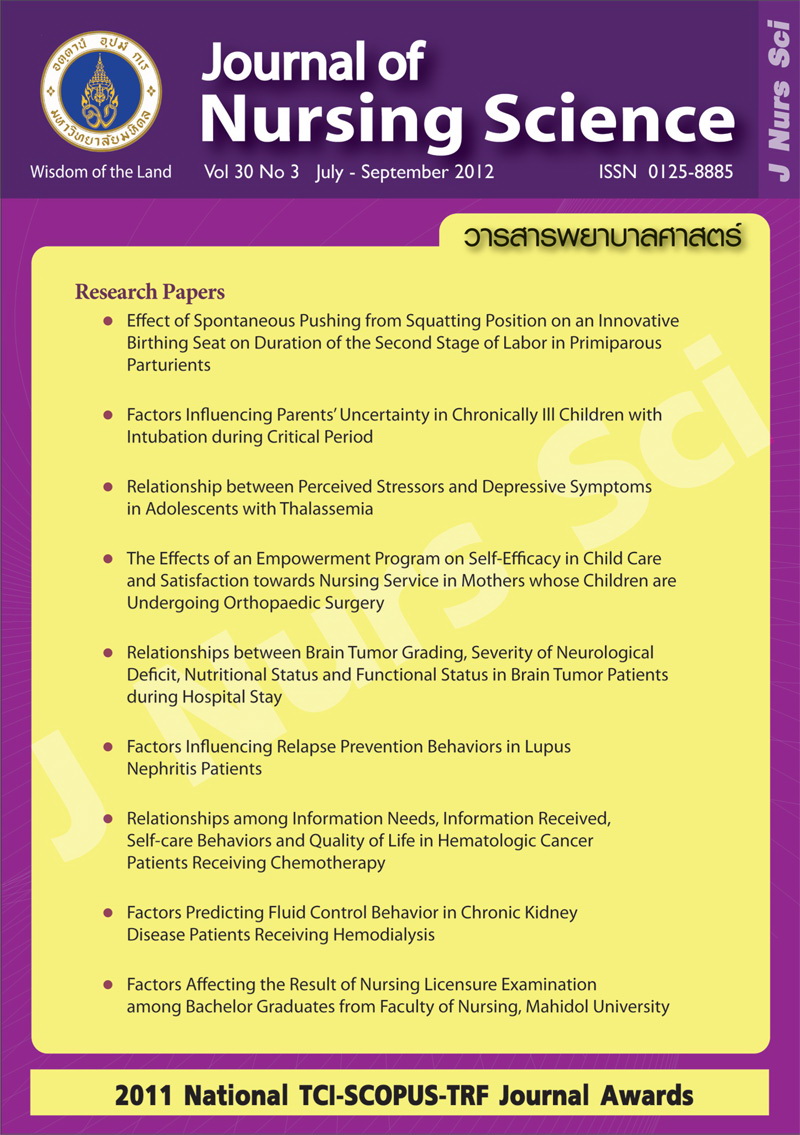Factors Influencing Parents’ Uncertainty in Chronically Ill Children with Intubation during Critical Period
Main Article Content
Abstract
Purpose: This study examined the influences of parental perception of the child’s illness severity, parental education, credible authority in healthcare staff, informational and emotional support on parents’ uncertainty in chronically ill children with intubation during critical period.
Design: Correlational predictive design.
Methods: Through a convenience sampling, 80 of either mothers or fathers whose chronically ill children being aged 3 months to15 years old, being intubated for the first time, and receiving treatment in the Pediatric Intensive Care Unit of Siriraj Hospital were selected. A demographic data form and the scales for parent’s perception of uncertainty, perception of the child’s illness severity, parent’s trust and confidence in healthcare staff, informational and emotional support were administered. Data were analyzed using descriptive statistics and multiple regression analysis.
Main findings: All study factors could explain 47.5% of the variance in the parents’ uncertainty (R2 = .475, F = 16.96, p < .001). The significant influencing factors were perception of the child’s illness severity (β = .443, t = 4.881, p < .001) and informational and emotional support (β = - .364, t = -2.817, p = .006).
Conclusion and recommendations: Nursing interventions should be developed to reduce the uncertainty of the parents whose chronically ill children are in crisis and require intubated by providing the explicit and sufficient information pertaining to their children’ sick condition together with sensitive and understanding approach.
บทคัดย่อ
วัตถุประสงค์: เพื่อศึกษาอิทธิพลของการรับรู้ความรุนแรงในความเจ็บป่วยของบุตร ระดับการศึกษาของบิดามารดา ความเชื่อถือและยอมรับในบุคลากรทีมสุขภาพ การสนับสนุนทางสังคมด้านข้อมูล และอารมณ์ต่อความรู้สึกไม่แน่นอนของบิดามารดาเด็กป่วยเรื้อรังที่ได้รับการใส่ท่อช่วยหายใจในระยะวิกฤต
รูปแบบการวิจัย: ศึกษาความสัมพันธ์เชิงทำนาย
วิธีดำเนินการวิจัย: กลุ่มตัวอย่างได้แก่ บิดาหรือมารดาของเด็กป่วยเรื้อรังอายุระหว่าง 3 เดือน - 15 ปี ที่เข้ารับการรักษาในหออภิบาลผู้ป่วยเด็กหนักของโรงพยาบาลศิริราช และได้รับการใส่ท่อช่วยหายใจครั้งแรก เลือกกลุ่มตัวอย่างแบบสะดวกได้จำนวน 80 คน เก็บรวบรวมข้อมูลโดยใช้แบบบันทึกข้อมูลส่วนบุคคล แบบสอบถาม 4 ชุดได้แก่ การรับรู้ความรู้สึก
ไม่แน่นอนของบิดามารดา การรับรู้ความรุนแรงในความเจ็บป่วยของบุตร ความเชื่อถือและยอมรับในบุคลากรทีมสุขภาพ และการสนับสนุนด้านข้อมูลและอารมณ์ วิเคราะห์ข้อมูลด้วยสถิติเชิงพรรณนาและการวิเคราะห์ถดถอยพหุคูณ
ผลการวิจัย: ปัจจัยที่ศึกษาทุกตัวสามารถร่วมอธิบายความแปรปรวนในความรู้สึกไม่แน่นอน ของบิดามารดาเด็กป่วยเรื้อรังที่ได้รับการใส่ท่อช่วยหายใจในระยะวิกฤตได้ร้อยละ 47.5 (R2 = .475, F = 16.96, p < .001) และปัจจัยที่มีอิทธิพลต่อความรู้สึกไม่แน่นอนอย่างมีนัยสำคัญทางสถิติ คือ การรับรู้ความรุนแรงในความเจ็บป่วยของบุตร (β = .443, t = 4.881, p < .001) และการสนับสนุนทางสังคมด้านข้อมูลและอารมณ์ (β = - .364, t = - 2.817, p = .006)
สรุปและข้อเสนอแนะ: พยาบาลควรพัฒนารูปแบบกิจกรรมการพยาบาลเพื่อลดความรู้สึกไม่แน่นอนของผู้ปกครองต่อความเจ็บป่วยของบุตรโรคเรื้อรังที่ต้องใส่ท่อช่วยหายใจในระยะวิกฤต ด้วยการให้ข้อมูลที่ชัดเจนและเพียงพอเกี่ยวกับสภาพความเจ็บป่วยของบุตร รวมทั้งการดูแลที่เต็มไปด้วยความเข้าใจและมีความละเอียดอ่อนต่อความรู้สึกของผู้เป็นบิดามารดา
คำสำคัญ: เด็กป่วยเรื้อรัง การใส่ท่อช่วยหายใจ ความรู้สึกไม่แน่นอน
Article Details
Copyright Notice: Nursing Science Journal of Thailand has exclusive rights to publish and distribute the manuscript and all contents therein. Without the journal’s permission, the dissemination of the manuscript in another journal or online, and the reproduction of the manuscript for non-educational purpose are prohibited.

Disclaimer: The opinion expressed and figures provided in this journal, NSJT, are the sole responsibility of the authors. The editorial board bears no responsibility in this regard.


